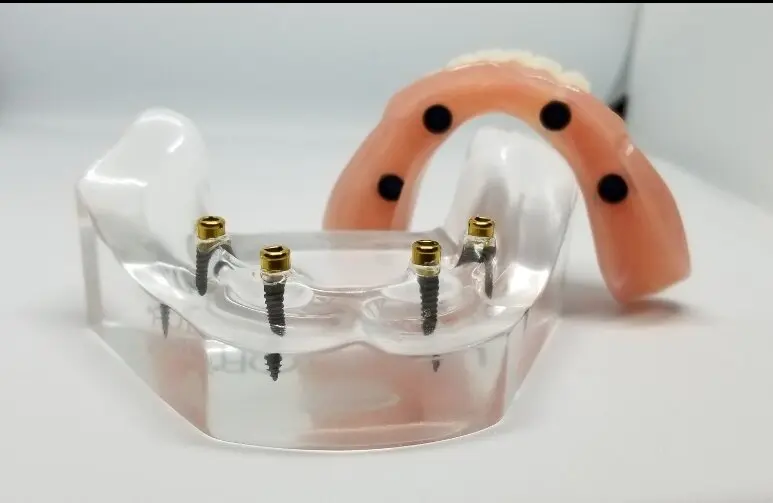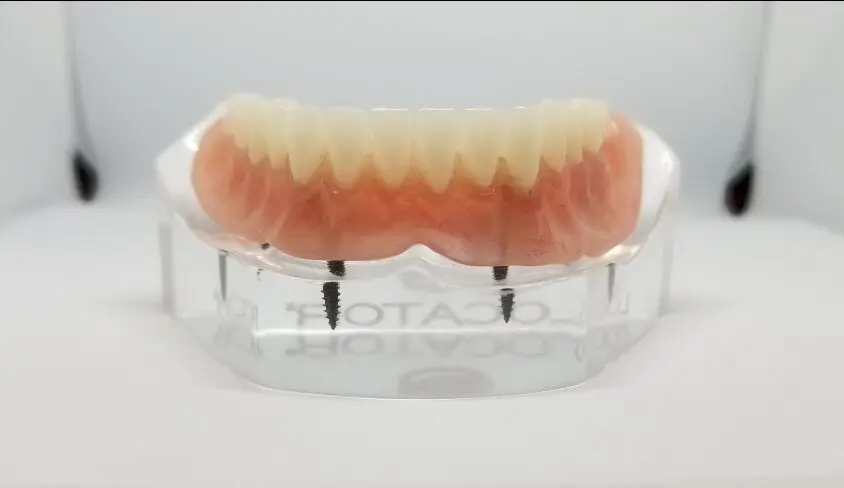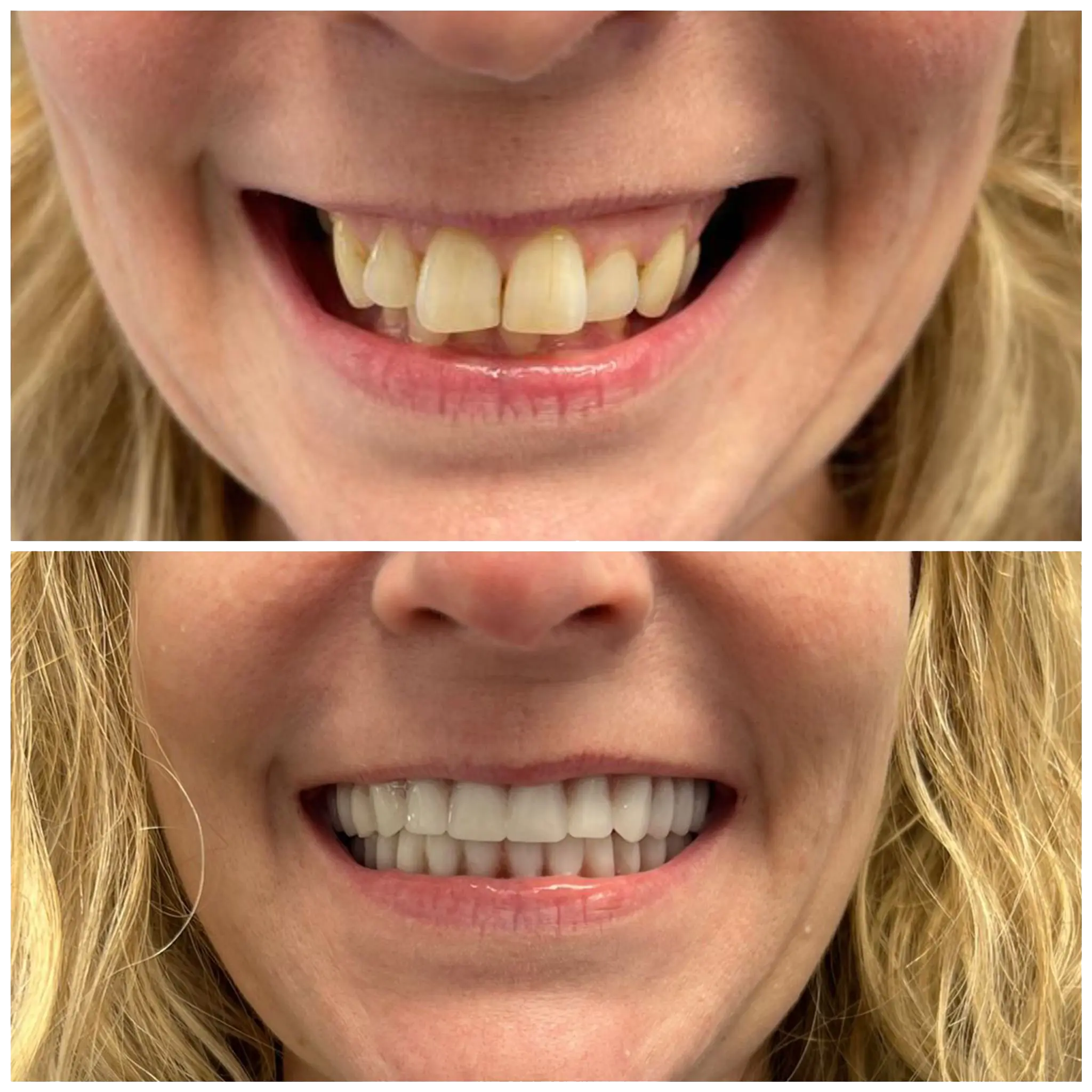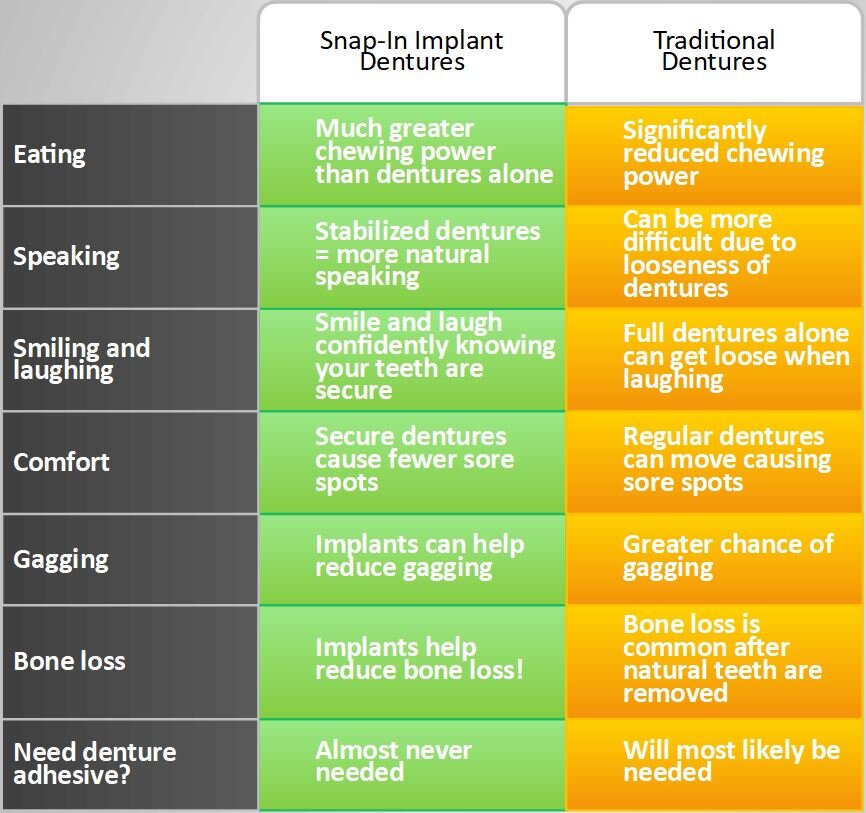
BENEFITS OF SNAP-IN DENTAL IMPLANT DENTURES:
Secure your teeth, no more floating (or flying out of your mouth when you sneeze), greater confidence in social situations
- Significantly improved chewing
- Easier to speak thanks to stable dentures
- More natural appearance
- Reduce or eliminate gagging
- Taste food better
- Increased stability = reduction of sore spots
- Bone retention
- Easy cleaning and maintenance
- More affordable than you might think
WHAT ARE SNAP-IN IMPLANT DENTURES?
These are dentures with special fittings that allow them to attach (snap-in) to the dental implants your doctor places.


The lower denture securely snapped on to the implants.
WHY SHOULD I CHOOSE IMPLANT DENTURES OVER TRADITIONAL DENTURES?
While traditional dentures typically look nice and are the most cost-effective way to replace bad or missing teeth, they can leave a lot to be desired in terms of overall function, stability, and chewing ability.

Shortfalls of traditional (non-implant) dentures:
- Limited chewing power – very little chewing power due to movement of the lower denture; usually only 10-20% of what a person had with natural teeth. The movements of a denture wearer’s tongue and cheeks continually pushes and pulls on the lower denture keeping it unstable.
- Speech – speaking can be difficult due to the movement of the lower denture.
- Embarrassment – caused by the inability to eat around other people, laugh loudly, and converse confidently due to fear of dentures becoming loose and falling out.
- Discomfort – since traditional dentures, especially lowers, often move around, they can rub and chafe the gums causing irritation and discomfort.
- Poor nutrition – again, due to the loss of chewing power, patients may be unable to eat a balanced diet and chew food sufficiently for proper digestion.
- Bone loss – after a person’s teeth are removed, they typically lose a great deal of bone and will continue to lose it for the remainder of their life. This means that traditional dentures become more and more difficult to wear over time.
- Gagging – traditional upper denture covers the roof of the mouth to provide suction and stability. Unfortunately, for many people, the denture covering the roof of their mouth causes them to gag. Trimming the denture to reduce this gagging leads to a decrease in stability and loss of natural suction.
Combining dental implants with dentures helps to improve all of these issues tremendously.
Anchoring your dentures with dental implants allows you to:
- Enjoy more of your favorite foods – By securing your denture with dental implants, patients are able to chew with much greater power and confidence.
- Speak confidently – speak in front of crowds or amongst friends and family with the confidence of knowing your denture is securely snapped on to your implants.
- Smile and laugh without worry of your dentures falling out
- Live more comfortably – dentures not moving as much, less rubbing and chafing
- Receive better nutrition – chew up food better
- Reduce bone loss – while a person may continue to lose bone after having their natural teeth removed, dental implants provide stimulation down into the jaw which encourages the body to continue to produce bone.
- Reduce or eliminate gagging – since your upper implant denture will be secured in place by the implants, a significant portion of the palate can be removed exposing the roof of the mouth. This reduces or eliminates gagging caused by your denture.
- Increased comfort – dental implants help reduce or eliminate the irritation caused by movement of the dentures.
- Taste your food better – most patients with implants can have part of their upper denture’s palate removed. This allows you to taste your food better.
OUR ACTUAL PATIENT’S SAME DAY SMILES






AM I A CANDIDATE?
The good news…most patients are candidates! We’ll just need to see you for a quick consultation to say for sure. At this appointment, we’ll take a 3-dimensional scan of your jawbones, the doctor will perform an oral examination of your mouth, and they will go over your medical history in detail with you.

HOW DOES THE PROCESS WORK?
- Procedure – after any remaining teeth are removed and any other necessary oral surgery procedures are performed, the implants are placed into the jawbone. After this, the implants are typically not visible. They will remain in your jaw untouched for at least 4 months while your bone attaches to them (osseointegration).
- Post op – we will see you back for a quick post-operative appointment, which we usually schedule for the day after your procedure. At this appointment, we will evaluate your mouth, ensure that any dentures are fitting as comfortably as possible, and answer any questions you may have.
- Soft liners / soft re-fittings – soft liners are cushions that we place in your denture periodically as you heal. They fill in the spaces between your gums and dentures that are created as you heal, and they also give your gums some cushioning. They help your dentures fit and feel better.
- Uncovery – this is a smaller surgical procedure where we expose the implants and place small healing abutments on top of them to properly shape your gum tissue and prepare you to finish your snap-in dentures.
- Attachment of implants to dentures – we will change our your healing abutments for your denture abutments and we perform the steps necessary to attach your dentures to your implants. This step can usually be done in one day, but sometimes can take slightly longer.
HOW MANY IMPLANTS WILL I NEED FOR MY DENTURES?
- Upper – an upper implant denture requires at least 4 implants.
- Lower – a lower implant denture requires at least 2 implants, although 3 or 4 typically provide a significant improvement in retention and stability.
HOW MUCH DO IMPLANT DENTURES COST?
Upper OR lower snap-in implant denture
$8,995 + the cost of extractions
These replace all of your top OR bottom teeth with a secure denture held in by dental implants. This price includes 4 dental implants, abutments, snaps, and your snap-in denture.
Full mouth upper AND lower snap-in implant dentures
$17,990 + the cost of extractions
These replace all of your top AND bottom teeth with secure dentures held in by dental implants. This price includes 8 dental implants (4 upper, 4 lower), abutments, snaps, and your snap-in dentures.
FINANCING / PAYMENT OPTIONS
Dental implants are an important investment in yourself, and having the option to break this investment down into monthly payments can help make these life-changing services more accessible and easier to fit into your budget.
We work with multiple financing providers to offer payment plans to cover either all or part of your dental implant procedure.
SNAP-IN IMPLANT DENTURES VS TRADITIONAL FULL DENTURES

ARE THESE MINI IMPLANTS YOU’RE USING WITH SNAP-IN DENTURES?
No! We only place standard, full size dental implants at our clinic. These have a much higher success rate and will last much longer than mini implants.
Please proceed with caution at any office recommending mini dental implants as a permanent solution. They have a very high failure/complication rate.
Call now (615) 378-3180Frequently asked questions – FAQs
An upper implant denture requires at least 4 implants. A lower implant denture requires at least 2 implants. The more implants you have, the more stable your denture will generally be. This is especially true with the lower denture. Three or 4 implants in the lower is usually much better than 2.
For pricing information on snap-in implant dentures and other dental implant services click here!
In many cases, yes! We’ll just need to see you for a free consultation, during which we will do a 3D CBCT scan of your jaw to see if you have enough bone for dental implants.
No, we must allow time for your implants to integrate with your bone. This is what makes your implants truly stable and will help ensure you enjoy many years or decades of use out of them. We typically wait between 4 and 6 months before attaching to your implants.
While experiences will vary, you should expect some discomfort and possibly swelling after your procedure. Many patients come in the next day for their post op appointment reporting very little discomfort. You will be prescribed pain medication to help alleviate any discomfort.
We do not currently put patients to sleep, however, we do offer oral conscious sedation. This medication will help to relax you and often makes it so you don’t even remember your procedure. For this, we write you a prescription, and you can pick it up at your pharmacy of choice. NOTE: You MUST have a driver for this procedure, someone who can drive you after you have taken your oral sedation pill(s). You MUST NOT operate a motor vehicle or any machinery after taking your medication.
Yes! They are much more secure than dentures alone, and we are able to increase the retention with stronger inserts if you prefer.
Most patients with 4 implants in the upper are able to have a large portion of the palate (roof of the mouth) cut out of their denture. This increases the ability to taste for many patients, and also increases hot and cold sensitivity, making for a more natural experience. For those patients with a severe gag reflex, removing the palate of the denture can also help provide relief.
If you are a candidate for a palate-less denture, it will be removed from your final denture. This is after healing and osseointegration are complete and we are ready to attach to your implants (appromximately 4-6 months after placement of your implants).
Typically 1 to 2 times per year. This will depend on how many implants you have, how strong your bite is, how frequently you take your dentures in and out, and several other factors.
WARNING: PLEASE DO NOT BITE YOUR DENTURES INTO PLACE ON YOUR IMPLANTS! This will wear out your inserts significantly faster. Only place your implant dentures in by hand.
Alveoplasty is a procedure where the doctor contours your jawbone. This procedure is important because it can significantly improve the fit and comfort of your dentures.
Tori are bony knots that develop in the mouth of many patients. They are not harmful, however, they can prevent your denture(s) from fitting comfortably, so your doctor will often recommend having them removed.
Significant bleeding will have stopped before you leave the clinic, however, expect to have some slight bleeding (oozing) for 1-3 days after the procedure. In addition, you will most likely notice increased salivation when we first put your denture(s) in. When this increased saliva mixes with a little blood, it can look like a lot of blood. If heavy bleeding continues, please call the office.
An old home remedy that still works really well to help clotting and stop bleeding is the use of tea bags. Just get a regular tea bag, get it damp, squeeze out the excess water, place it on your extraction site or sites, and the bags will help you clot. Multiple tea bags can be used if needed. Replace the tea bags if they get saturated with blood. This process can be repeated as many times as you need.
We do not currently offer this type of implant. While titanium implants have been around for decades with a long track record of success, zirconia implants are very new to the market, so we do not know what their success will be like long-term. We want the most successful, most predictable long-term results for our patients, and for these reasons, we do not offer zirconia implants at this time.
Yes, any prosthetic in the mouth will get some amount of food under it. The great thing about implant dentures is how easy they are to clean. Just take them out; clean the denture(s), your gums, and implants; and snap them back in.
Every patient is different. Some return to work the next day, others wait a week or two. Since there is always the chance of bruising and swelling, and you’ll need to get used to eating and speaking with your new teeth, the longer you can take off, the better.
A soft liner is a cushion we place inside your denture to help it fit and feel better as your mouth heals and changes shape following extractions.
No, this is not just a procedure for the elderly. It’s actually quite common for people in their 40s, 30s, even 20s to need to replace their teeth. Replacing bad teeth can be hugely beneficial to your overall physical health. Also, having teeth that allow you to confidently smile, laugh, and converse can be hugely beneficial to your emotional health. Again, needing to replace teeth early in life is not uncommon at all.
- Ice packs
- Wash cloths you don’t mind throwing away
- Comfortable clothes you don’t mind throwing away
- Soft foods such as:
- Soups
- Yogurt
- Cottage cheese
- Smoothies
- Protein shakes
- Eggs
- Mashed potatoes (gravy optional)
Just as you would need practice in order to get used to functioning with a prosthetic leg, it will require some practice and patience to get used to your new prosthetic teeth. With that being said, since they are attached with implants, your dentures will be much easier to get used to than regular dentures.
Again, this will take a little time, but with some patience and practice, your mouth and tongue will quickly adjust. S’s will be the toughest to pronounce. Practicing words like “Mississippi” and “sixty six” will help you get used to your new teeth. In some cases, patients may have a slight lisp long term with implant dentures.
Some patients may experience very slight rocking with their dentures. For patient who have 2 lower implants, these must be placed in the front of the jaw making it possible for some rocking to occur. A dab of adhesive at the back on each side of the lower denture will usually take care of this.
In this case, your best bet would either be snap-in implant dentures or All-On-4.
Yes. Having removable implant dentures makes cleaning them very convenient. Just take them out; clean the denture(s), your gums, and implants; and snap them back in.
While titanium dental implants do have a 95+% success rate, yes, they can still fail. Some of the things that can cause them to fail:
- Failure to integrate into the bone
- Smoking
- Diabetes
If an implant fails within the first year, your dentist will replace it at no charge to you.
- Snaps – periodically you’ll need to change out the snap rings in your implant dentures. These wear and lose retention over time and as you take your teeth in and out. They’re quick and affordable to have changed out.
- Cleanings – just like with natural teeth, you’ll need to have your implants cleaned periodically. Any buildup on your implants will be removed and your dentures will be cleaned.
- Periodic re-fittings – your mouth will still change over time, so your dentures will need to be re-fitted to ensure their best performance and ensure that unnecessary stress isn’t being put on your implants.
- Home maintenance – it only takes a few minutes a day. Take your dentures out 1-2 times per day and brush them with a denture brush or very soft bristled toothbrush. Also, don’t forget to clean your implants. scrub these with a very soft dental brush also.

